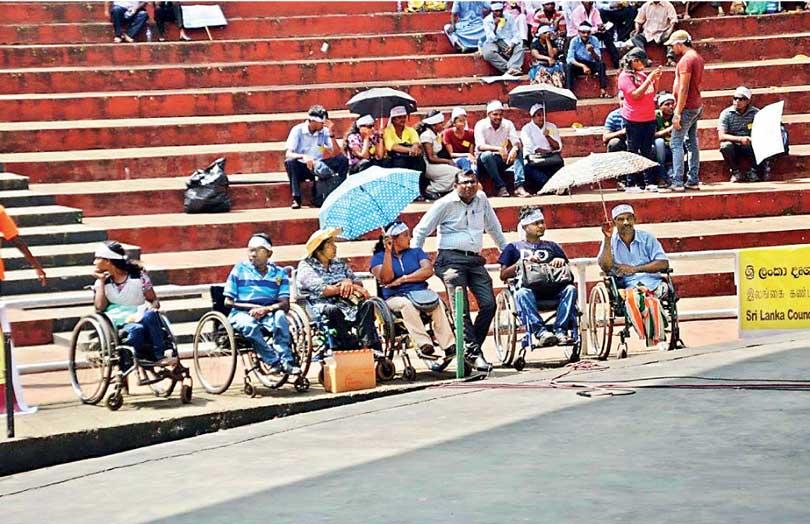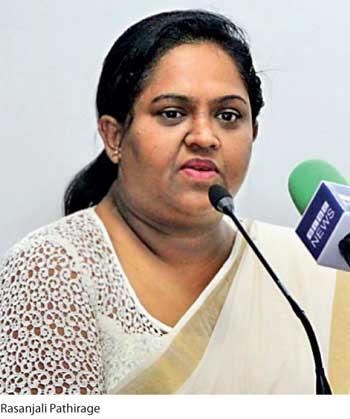22 Jun 2021 - {{hitsCtrl.values.hits}}

 A 2017 census done by the Department of Census and Statistics estimates that around 8.7% of the population in Sri Lanka fall into the category of People with Disabilities (PwDs). This is around 300,000 people. But four years down the line, this number could be much more or less. As a result, miscalculations in the numbers have made it difficult for groups advocating for the rights of PwDs to keep track of how many of them are affected, particularly during the pandemic.
A 2017 census done by the Department of Census and Statistics estimates that around 8.7% of the population in Sri Lanka fall into the category of People with Disabilities (PwDs). This is around 300,000 people. But four years down the line, this number could be much more or less. As a result, miscalculations in the numbers have made it difficult for groups advocating for the rights of PwDs to keep track of how many of them are affected, particularly during the pandemic.
No health
guidelines issued
 “There have been no health guidelines issued for PwDs to follow during the pandemic period,” opined Rasanjali Pathirage, President of Disability Organisations Joint Front (DOJF). “People with visual impairments need someone else’s support. In this case there won’t be social distancing and it would be a risk during this period. Even if PwDs are infected with COVID we do not know of any statistics or confirmed reports since only the total number of infected persons is being reported. Even if health guidelines were in place there are shortcomings in communicating them to PwDs. There are a handful of sign language interpreters in Sri Lanka and due to the prevailing situation training programmes too have stopped. Training a sign language interpreter is not a one-off job since they need to integrate with this crowd. So far there is no focal point to address or report any issues related to PwDs. I think that’s something the government needs to prioritise.
“There have been no health guidelines issued for PwDs to follow during the pandemic period,” opined Rasanjali Pathirage, President of Disability Organisations Joint Front (DOJF). “People with visual impairments need someone else’s support. In this case there won’t be social distancing and it would be a risk during this period. Even if PwDs are infected with COVID we do not know of any statistics or confirmed reports since only the total number of infected persons is being reported. Even if health guidelines were in place there are shortcomings in communicating them to PwDs. There are a handful of sign language interpreters in Sri Lanka and due to the prevailing situation training programmes too have stopped. Training a sign language interpreter is not a one-off job since they need to integrate with this crowd. So far there is no focal point to address or report any issues related to PwDs. I think that’s something the government needs to prioritise.
On the other hand, deaf people who have been doing coolie work for a living are unemployed in the face of the pandemic. We do not have figures to find out how many of them are receiving the Rs. 5,000 allowance. One of the main issues is that there is no proper method to categorise PwDs. People using wheelchairs are also categorised as PwDs, so there could be miscalculations.
Lack of accessibility facilities
A research study done on Transport Equity in Sri Lanka by Varuni Tennakoon et al., sheds light on several challenges faced by PwDs and older persons. Participants for this study included four PwDs who mentioned challenges when walking on the road and by-roads. They felt that the ‘physical dimensions of road infrastructure, particularly pedestrian environments, were not safe’. Lack of sidewalks and pavements often obstructed with billboards, posts, parked vehicles and vendors were another challenge. The study further points out that inaccessible design of public buses, trains and stations was identified as a significant barrier to safe transportation which created physical and emotional discomfort.
When asked about challenges with regard to accessibility, Pathirage pointed out that none of the buses or trains have been designed to support PwDs. “Even though there are laws and regulations and elaborate project proposals to improve accessibility for PwDs, they don’t get approved beyond the planning stage. Without transport services they are unable to attend school and it has a huge impact on their lives thereafter. Therefore it has become a challenge to empower them to serve the country.”
Requests fallen
on deaf ears
The DOJF on many occasions have requested the relevant authorities to conduct a census on the differently-abled population. “So far it hasn’t been successful. If every Divisional Secretariat could have a database of PwDs in a particular area and if the relevant Ministry could maintain a central database of the entire differently-abled population, this matter could be solved to a greater extent.”
But to which Ministry do they have to report to is another problem which Pathirage explains later on.
However, when the incumbent leader’s ‘Vistas for Prosperity and Splendour’ manifesto was being launched, the DOJF signed a Memorandum of Understanding along with another Organisation. But this event seems to have been limited to just another propaganda attempt. “Ever since that day we haven’t had a chance to meet the President and discuss our issues and lay out a policy framework for the well-being of PwDs. Several requests to meet the President have been turned down and we suppose it is due to the prevailing situation.”
Vaccine inequality
After many discrepancies with the administration of vaccines, authorities had to keep reiterating the fact that vaccines are being administered according to a scientific process. But how scientific this process remains a question when politicians and influential people intervened during vaccination drives. This scientific process is once again questioned when it comes to PwDs. “So far we haven’t seen any priority given to PwDs in the administration of vaccines. We made requests to the Task Force and to find out that around 400,000 people are not being given a vaccine is a very unfortunate situation. These people are unable to travel during the lockdown and what about people who cannot move about at all? On the other hand people with spinal injuries need to be vaccinated to keep their immune systems strong. In certain cases, the catheters need to be changed, but there’s no way they could do it on their own. During the second wave the Department of Social Services got involved in providing relief and necessary services to these people, but this time we don’t see any such programmes.”
Which authority is responsible for them?
The Sri Lanka government signed the United Nations Convention on the Rights of Persons with Disabilities on March 30, 2007, and ratified it on February 8, 2016, after a lapse of 10 years. “But even though the government is party to the UN Convention, it is yet to accede to an Optional Protocol. On the other hand, the Protection of the Rights of Persons with Disabilities Act No. 28 of 1996 addresses equality in recruitment for employment and admission to educational institutes along with physical accessibility to public places, but it does not have provisions to safeguard rights of persons with disabilities. Subsequently, a draft Disability Rights Bill was prepared in 2006 and was approved by the Cabinet of Ministers in 2008. However, even after repeated amendments, the Bill was never tabled in Parliament for the past 10 years to be passed as a law.”
However, the Bill was redrafted in 2016 and was submitted to the Legal Draftsman’s Department when it was observed that it was not in compliance with Article 33 of the UN Convention. Therefore, it is the duty of the state to draft the Bill in compliance with Article 33 of the Convention. Another issue is the lack of an authority to report on certain issues. If a female with disabilities goes to the Women’s Affairs Ministry, she’s being redirected to the Social Service Department and vice versa.”
The bigger worry, however, is that many women with disabilities experience sexual abuse, harassment and rape. “But in the case of a deaf person, they cannot communicate it properly; in the case of a mentally challenged person, they can’t remember the perpetrators. Most family members do not want to reveal these incidents, and therefore they don’t get reported. Even if they are produced in courts, there comes the issue of sign language interpreters again. Therefore, the relevant authority or Ministry should implement programmes to address the rights of this segment.”
Pathirage said that the state could look at providing employment for PwDs such as issuing tickets at expressways. “Some of them are representing Sri Lanka at Paralympics this time, and we need to be proud of them. After all, they could serve the nation as equally as any other person provided that they have the appropriate working environment,” she said on a concluding note.
Officials unavailable
Several attempts to contact State Minister of Primary Healthcare, Epidemics and COVID Disease Control Dr. Sudarshini Fernandopulle and Ministry of Health’s Director General – Health Services Dr. Asela Gunawardena to inquire about the government’s plan to integrate PwDs in vaccination drives and COVID relief programmes proved futile.
19 Apr 2024 2 hours ago
18 Apr 2024 3 hours ago
18 Apr 2024 4 hours ago
18 Apr 2024 4 hours ago
18 Apr 2024 5 hours ago